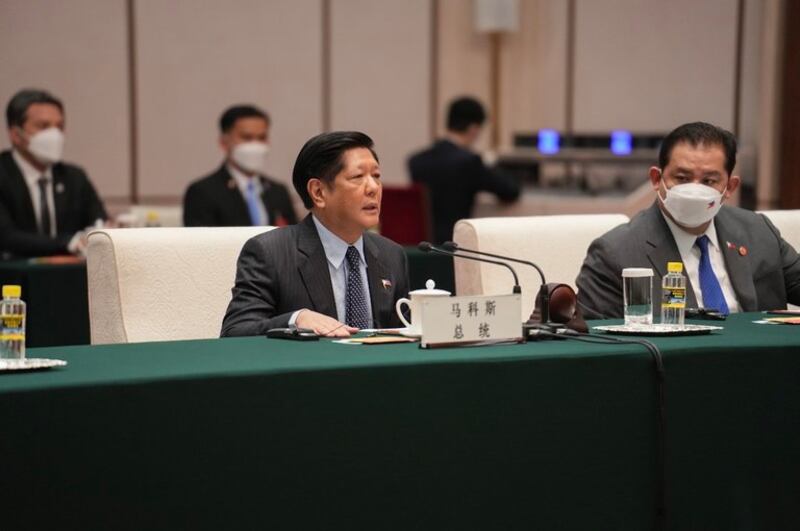Beijing said it would work with Manila to resolve maritime issues amicably as Philippine President Ferdinand Marcos Jr. met with Chinese counterpart Xi Jinping in Beijing on Wednesday amid bilateral tensions over the South China Sea.
China also noted it was ready to resume talks on joint oil and gas exploration in the contested waterway, while Marcos said that Manila hoped to announce the resumption that it had earlier terminated due to Beijing’s territorial claims in the sea region.
“China will work with the Philippines to continue to properly handle maritime issues through friendly consultation, resume negotiations on oil and gas exploration, promote cooperation on oil and gas exploration in non-disputed areas, and conduct green energy cooperation on photovoltaics, wind power, and new energy vehicles,” the Chinese foreign ministry said in a statement about the Marcos-Xi meeting.
“The two sides have identified agriculture, infrastructure, energy, and people-to-people exchanges as four priority areas of cooperation,” the statement added.
Marcos was undertaking his first state visit to Beijing as president weeks after Manila complained about Chinese boats “swarming” in South China Sea waters within the Philippines’ exclusive economic zone.
For his part, Marcos said the Philippines and China should strengthen their partnership to make the two countries stable and strong.
“We are hoping that after the pandemic becomes more manageable, that we will not only return to the path that we were on before the pandemic but that we even build-up to greater heights … [in] our participation in joint programs and joint ventures together,” Marcos said, according to a statement by the Philippine Office of the Press Secretary.
Marcos mentioned the continuing negotiation for joint exploration in the South China Sea, saying the issue is very important to the Philippines.
“I really hope – I would very much like, as you have suggested, Mr. President, to be able to announce that we are continuing negotiations and that we hope that these negotiations will bear fruit because the pressure upon not only China, not only the Philippines but the rest of the world to move away from the traditional fronts of power,” he said.
Marcos’ immediate predecessor, Rodrigo Duterte, had ended talks over joint exploration because of China’s claims that overlap with Manila’s in the South China Sea.
China claims nearly all of the South China Sea on historical grounds, including waters within the exclusive economic zones of Brunei, Malaysia, the Philippines, Vietnam, and Taiwan. Beijing also claims historic rights to areas of the waterway that overlap Indonesia’s exclusive economic zone as well.
Since taking office in June, Marcos has repeatedly stated that his government would assert a 2016 international arbitration court ruling, which Manila won and which invalidated China’s vast claims to the sea region.
Beijing has ignored the ruling.
Manila already has filed 65 diplomatic protests against Beijing under Marcos’s leadership.

Earlier on Wednesday, Marcos met Chinese Premier Li Keqiang and focused on discussing trade and investments, according to the office of the Philippine leader.
Marcos noted that both countries should “further their relationship” although there were some “difficulties” that needed to be dealt with.
He did not mention what these difficulties were, but Manila has filed numerous diplomatic complaints against Beijing since last year over China’s continued heavy presence in South China Sea areas it considers are within its exclusive economic zone.
Marcos noted that Li had told him on the sidelines of the Association of Southeast Asian Nations (ASEAN) summit in Cambodia in November that their bilateral partnership “far outweighs” the differences.
China has been the Philippines’ major trading partner, posting a total trade of U.S. $29.1 billion from January to September 2022, with exports amounting to $8.1 billion and imports $21 billion.
China is also a major contributor to the country’s tourism industry. Last year, the Philippines recorded 9,574 tourist arrivals from China, according to statistics.
House Speaker Martin Romualdez, who was part of the Philippine delegation, said they also met with China’s top legislator, National People’s Congress Standing Committee chairperson Li Zhanshu, who expressed the same sentiment.
“He (Li) feels and believes that our relationship should be deepened and strengthened through our legislative bodies, acting in coordination and having more engagements and meetings. So, that’s why we will look forward to the invitations that have actually been extended in the previous years but due to COVID, it did not materialize,” Romualdez told Filipino reporters.
“But now that China is opening up this year, we look forward to seeing these same engagements and these exchanges between the Congress of China, and the Congress and Senate of the Philippines come to fruition in the year 2023,” he added.
Dennis Jay Santos in Davao City, southern Philippines, and Luis Liwanag in Manila, contributed to this report. RFA Mandarin, which is part of Radio Free Asia, also contributed to this report. RFA is a news service affiliated with BenarNews.
